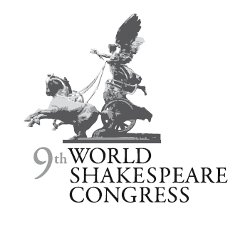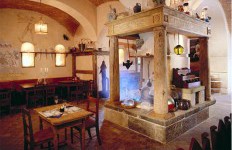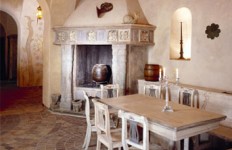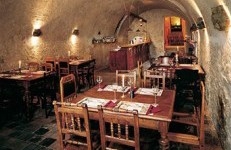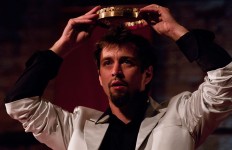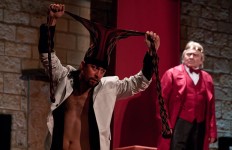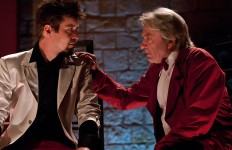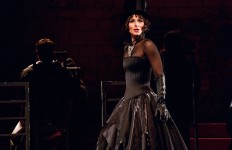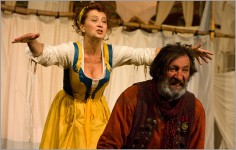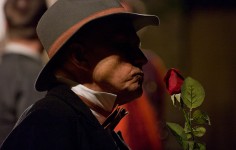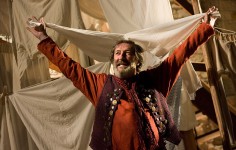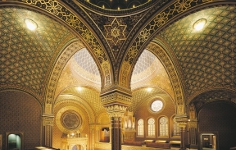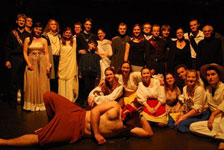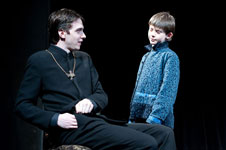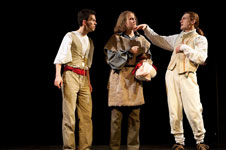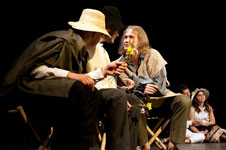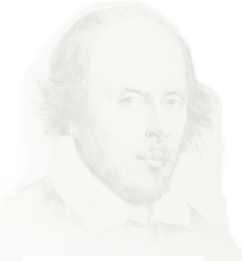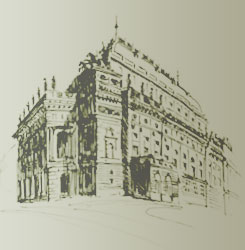Social and Cultural Events
and the Accompanying Programme
Social Events
Congress Opening and Welcome Reception
July 17, 2011, 17:00 – 21:00
National Theatre
Narodni street 223/2, Prague 1
Included in the registration fee
Congress Dinner "SOLD OUT"
July 20, 2011, 20:30 – 23:00
Restaurant Vikárka – Rudolph´s Foundry
Location - Prague Castle
Price: 50 EUR per person
Price includes 4-course menu and drinks
At the very beginning of the 14th century church institutions were located at the site of the restaurant, however later Charles IV granted the Bishop of St. Vitus Cathedral the right to brew beer and the monks’ liquor flowed here in abundance. During the Hussite wars the brewing of beer was discontinued, however it was renewed during the reign of Rudolph II. His court abounded in Spanish grandees who spent their riches in the local tavern, and the site was also frequented by artists from all over the world selling their works in the Vladislaus hall.
In the autumn of 2005 the entire restaurant underwent extensive reconstruction. The project was prepared by the architectural studio of Ladislav Lábus.
Rudolph’s Foundry - A long, forsaken-looking building erected in 1594 by Rudolph II on the site of a knight’s and rebuilt in the Hussite period. During Rudolph´s reign there was an alchemist workshop here. The building was later changed into a court stable and finally served as a storage space, even during the rebuilding of the St. Vitus Cathedral, which began in 1876. It was renovated in 1964 and recently underwent a complete reconstruction.
Rudolph´s Foundry is accessible from the Foundry courtyard and from the Mihulka tower, both spaces served as an alchemistic workshop during the times of Rudolph II. It has a capacity of 240 people.
You can book your ticket via on-line Excursion and Tours form.
Congress Farewell Drinks
July 22, 2011, 18:30 – 20:30
The Ambassador´s Residence
U. S. Embassy in Prague
Dr. Zikmunda Wintra, Prague 6
Included in the registration fee
You are kindly asked to confirm your attendance at the registration desk by Wednesday, July 20, 12 o'clock, at the latest. There you will receive a personal ticket that you will have to show, together with your picture ID and your congress badge at the entrance to the U.S. Ambassador's Residence.
Please note that the Congress organizers and participants have to comply with rules for guests entering the U.S. Ambassador´s Residence. If you fail to show the ticket, your picture ID and Congress badge, you will not be admitted to the Farewell Drinks.
Cultural Events
The highlights will be the productions of Henry IV (both parts in one performance) and The Merry Wives of Windsor during the Shakespeare Summer Festival in the Prague Castle and of Macbeth, staged on Saturday, 23 July by the Jihočeské divadlo in the Baroque garden of the Castle of Český Krumlov, Revolving Auditorium. The tickets are available on Excursions and Tours on-line form.
Henry IV "SOLD OUT"
The Summer Shakespeare Festival is the only event in Prague to offer Shakespeare’s plays in authentic historical settings. It is one of the oldest and biggest open-air festivals in Europe that focuses solely on the work of the illustrious playwright. The festival takes place every summer at the most beautiful Czech and Slovak castles, attracting around 80,000 spectators annually. The beginning of the festival dates back to the early 1990s; an idea of Václav Havel who, as President of the Czech Republic, intended to open the Prague Castle to live arts and a variety of cultural events.
Henry IV (according to the Czech translation by Professor Martin Hilský) will be produced at the most exquisite of the festival’s stages, the Supreme Burgrave's House of the Prague Castle. The two-part play has been abridged into one performance by Lucie Bělohradská, an experienced theatre director and playwright.
July 18th and 19th, 8:30 pm
The performance ends at 11 pm and is in Czech language.
The Supreme Burgrave's House of the Prague Castle, Jiřská 6, Praha 1
Tickets on sale for 35 EUR
You can book your ticket via on-line Excursion and Tours form.
The Merry Wives of Windsor "SOLD OUT"
The comedy, translated into Czech by Professor Martin Hilský, is directed by Jiří Menzel, one of the central personalities of the Czechoslovak New Wave Cinema. The production features some of the best Czech comedy actors. It will be performed at the picturesque summer stage at the Lichtenstein Palace, directly in Malostranska Square.
July 18th and 19th, 8:30 pm
The performance ends at 10:45 pm and is performed in Czech language.
The Music and Dance Faculty of the Academy of Performing Arts in Prague, Malostranska Square 13, Praha 1
Tickets on sale for 35 EUR.
You can book your ticket via on-line Excursion and Tours form.
Shylock’s Ghosts: The Afterlife of Shakepeare’s Jew
Organized by the Jewish Museum in Prague on the occasion of the 9th World Shakespeare Congress, with a kind support of Ms. Mary Ann Cloyd of Los Angeles, California.
July 18th, 2011, 9:00 pm
Jewish Museum in Prague – Spanish Synagogue
Vězeňská 1, Prague 1
Director: David Peimer
Actor: Robert Gordon
The Merchant of Venice as a text exists today in the shadow of the Holocaust. Moving from medieval to modern anti-Semitism, the performance will deconstruct Shakespeare’s play in a range of different cultural contexts.
In Shakespeare’s England the play would have been viewed within the perspective of a long tradition of Christian anti-Semitism (anti-Judaism) typified by the later views of Martin Luther:
First... set fire to their synagogues or schools... This is to be done in honor of our Lord and of Christendom, so that God might see that we are Christians. But if we now... were to protect and shield such a house for Jews, existing right before our very nose, in which they lie about, blaspheme, curse, vilify, and defame Christ and us... it would be the same as if we were doing all this and even worse... Second, I advise that their houses be razed and destroyed... Third, all their prayer books and Talmudic writings, in which such idolatry lies, cursing, and blasphemy are taught, be taken from them… Fourth, I advise that their rabbis be forbidden to teach henceforth on pain of loss of life and limb. (Martin Luther, On the Jews and their Lies, 1543).
Regardless of what Shakespeare's own intentions may have been, the play has been made use of by anti-Semites throughout its history. The end of the title in the 1619 edition "With the Extreme Cruelty of Shylock the Jew..." describes how Shylock was viewed by the English public in the 1590s.
The Nazis used Shylock for their propaganda. Shortly after the ‘Kristallnacht’ pogrom in 1938, The Merchant of Venice was broadcast for propagandistic ends over the German airwaves. Productions of the play followed in Lübeck (1938), Berlin (1940), and elsewhere within Nazi-occupied territory.
Was there any form of filth or crime... without at least one Jew involved in it. If you cut even cautiously into such a sore, you find like a maggot in a rotting body, often dazzled by the sudden - a Jew.” (Hitler)
The Jew... is an exploiter: the Jews are a people of robbers. He has never founded any civilization, though he has destroyed civilizations by the hundred... everything he has stolen. "(Hitler – speech in Munich, July 1922)
The depiction of Jews in the literature of English-speaking countries … bears a strong imprint of Shylock. Much of English literature up until the 20th century depicts the Jew as "a monied, cruel, lecherous, avaricious outsider tolerated only because of his golden hoard". Such anti-Semitic notions are a grotesque distortion of the historical facts. During Shakespeare's day, money lending was a very common occupation among Jews. This was due to Christians staying out of the profession due to their belief at that time that usury is a sin and the fact that it was one of the few professions available to Jews in medieval Europe, who were prohibited by law from most professions.
The performance by Robert Gordon, directed by David Peimer, deploys a number of contrasting interpretations of Shakespeare’s play in the context of the history of European anti-Semitism to explore the various possible meanings it may have today.
David Peimer is a Professor of Theatre at University College, Falmouth, UK and at the University of the Witwatersrand, Johannesburg, and directs theatre for the Nobel Prize winner Pinter Centre in London. He has won many awards (including the Soros Open Society Award, Goethe Inst Award, South African National Playwriting and others), directed many plays in 3 continents, and given numerous papers around the world. He has also been Professor of Theatre at New York University (Prague campus). Born in South Africa, Peimer graduated from Columbia University on a Fulbright Scholarship. He has worked as a director and playwright in South Africa, Prague, New York, the UK, Germany and directed over 25 plays of which 7 were his own. His most recent book of plays Armed Response; Plays from South Africa was published in 2009. Peimer has directed 3 plays in English in Divadlo Na Zabradli (Prague, CZ), working with a multi-national ensemble of actors. He was also the only artist from Africa invited to stage work at the Prague Quadrennial in 2003. For this, he worked with performers from many countries and created a major installation in the Prague.
Robert Gordon is Professor of Drama at Goldsmiths University of London where he is the Director of the Pinter Centre for Performance and Creative Writing. He has worked in the UK, South Africa, Italy, the USA and Ireland as an actor, playwright and director. His play about the impact of apartheid on South African women, Red Earth, and Waterloo Road, his play about Lilian Baylis, were presented at the Young Vic. He acted in A Chekhov Quartet which toured the UK before being performed in Moscow and Yalta in 1990. In the USA he has acted Pinter’s Monologue and directed The Lover and Ashes to Ashes. He was co-director of Moveable Feast Company in Dublin for whom he directed the theatre pieces, Beds, La Corbiere, Le Crapaud and the trilogy Jersey Lilies by Irish poet Anne Hartigan in Dublin and the USA. In London, he has directed rarely performed Restoration plays such as Wycherley’s Love in the Wood and The Plain Dealer, and Etherge’s Love in a Tub. His production of a site-specific version of Calvino’s Invisible Cities played in over twenty outdoor locations in Rapallo in 2002 and he directed his own adaptation of Baricco’s Novecento for the Teatro della Clarissa and Teatro Portofino. In the USA, Robert has taught performance theory and practice at Duke University, Colby College, State University of New York, in London at Royal Holloway, the Guildhall School of Music and Drama, the Actors’ Centre, BADA, the Drama Studio, and the Acting Company as well as at Witwatersrand University, Durban University of Technology, Natal Playhouse in South Africa.
The Winter´s Tale
July 18th and 19th, 19.30
Charles University Workshop Production.
The performance ends at 22.45 and is in English.
Theater Na Prádle, Besední 3, Praha 5 (tram stop ÚJEZD)
Tickets on sale for 150 CZK
Shakespeare Production (also known as Charles University Workshop Production) was formed in 1993 within the Department of English and American Studies at the Faculty of Arts, Charles University in Prague. The group has been performing Shakespeare's plays - under the direction of John Martlew - in the original unabridged version. The audience thus has a perfect opportunity, rather rare in the Czech Republic, to experience the original language and poetics of the Elizabethan era.
The ensemble has already presented ten different plays, always with a great success. Our members, Charles University students, are actively involved in all the theatre activities, including costume and properties design, prompting, etc Tickets will available at the registrations desk at the faculty and also in the theatre before the performances.
Leaving
Screening of Václav Havel's film Leaving (Odcházení, 2011), based on his eponymous play (2007).
July 21st, 2011, 20:30
Lucerna Cinema
Vodičkova 36, Prague 1
Free tickets available at the Congress registration desk
Michael Žantovský on Leaving in World Affairs
The Accompanying Programme
The New Scene of the National Theatre has prepared an accompanying programme to coincide with the Congress, open to the public.
SHAKESPEAREAN OPEN-AIR CINEMA AT THE NATIONAL THEATRE PIAZZETTA
Every evening of the week of the Congress, a projection of a Shakespearean film adaptation will take place in the open area behind the New Scene building, the so-called piazzetta. All projections are free of charge.
17 June, 21:30 Prospero’s Books
A symbol-ridden film shot by Peter Greenaway and based on Shakespeare’s The Tempest. The protagonist is the former Duke of Milan, Prospero, banished to live on a desert island, where he sojourns together with his little daughter and twenty-four books, the essence of all human knowledge and imagination. Thanks to these books, Prospero is able to build a magical island empire, command all the supernatural creatures and avenge himself upon his enemies. Greenaway has created an exceptionally imaginative, almost baroquely luxuriant, work where captivating images are accompanied by a remarkable soundtrack. Directed by: Peter Greenaway; music: Michael Nyman; starring: John Gielgud, Michel Blanc, Erland Josephson, Tom Bell, Kenneth Cranham, Mark Rylance, Pierre Bokma, and James Thiérrée.
18 June, 21:30 Al Pacino – Richard III
An artistic documentary film combines a film inquiry (involving both ordinary people on the street and important theatre directors, scholars and historians) with Al Pacino’s own reflections on approaching Shakespeare’s drama, while also containing a series of staged key scenes from Richard III (both in the form of rehearsals and grandiose film scenes). Directed by: Al Pacino; music: Howard Shore; starring: Al Pacino, Alec Baldwin, Kevin Conway, Kevin Spacey, Winona Ryder, F. Murray Abraham, Kenneth Branagh, Kevin Kline, James Earl Jones, Rosemary Harris, Peter Brook, Derek Jacobi, John Gielgud, and Vanessa Redgrave.
July 19th, 21:30 Romeo and Juliet 63
A fascinating insight into the emergence of one of the most famous Shakespearean productions in the history of the National Theatre – Romeo and Juliet, directed by Otomar Krejča in 1963. This unique and rarely shown documentary stars Jan Tříska as Romeo, Marie Tomášová as Juliet, Olga Scheinpflugová as the Nurse, Luděk Munzar as Mercucio and many other actors from the drama company of the National Theatre. Directed by Radúz Činčera.
July 19th, 22:30 A Midsummer Night's Dream
Even in the city centre you can experience a magical evening in the wood of Athens! As his last film, Czech artist and director Jiří Trnka chose Shakespeare's story of two couples unhappily in love, of mechanicals intoxicated by the theatre and of supernatural beings with many human weaknesses. Through this world famous story, Trnka wanted to show the virtuosity of the Czech school of animation, which at that time was experiencing its heyday. This immensely difficult project arouses admiration and respect even after so many years. The music was composed by Václav Trojan and performed by the Czech Philharmonic Orchestra, conducted by Karel Ančerl and accompanied by Kühn's Children Choir. The film received many international and local awards and is rightly considered a treasure in the world animated film. Directed by Jiří Trnka.
July 20th, 21:30 A Merchant of Venice
This Shakespeare's play gained a new intensity in Michael Radford's film from 2004. A timeless story about chance and fate governing human lives, but also about anti-Semitism. Radford engaged a stellar cast and created a classic adaptation, illustrated with attractive film images. Directed by Michael Radford; music: Jocelyn Pook; starring: Al Pacino, Jeremy Irons, Lynn Collins, Joseph Fiennes, Gregor Fisher, Charlie Cox, Anton Rodgers, Ben Whishaw, Kris Marshall, Ron Cook and others.
21 June, 21:30 Henry V.
This film version of Shakespeare’s eponymous history play was the directorial debut of Kenneth Branagh, an Irish Shakesperean actor who is also well-known today as a director. Branagh tried to update the story of the young English king and free himself from a traditional approach: his king is torn by doubts and suffers from feelings of loneliness, despite becoming a victor and incumbent of the French throne. Directed by and starring: Kenneth Branagh; also starring: Emma Thompson, Derek Jacobi, Charles Key and Fabian Cartwright.
22 June, 21:30 Shakespeare in Love
The screenwriters Marc Norman and Tom Stoppard wrote an intriguing and funny story inspired by Shakespeare’s life and work. The film was awarded seven Oscars, including the Best Film, Best Actress in a Leading Role (Gwyneth Paltrow) and the Best Actress in a Supporting Role (Judi Dench). Direction: John Madden; music: Stephen Warbeck; starring: Gwyneth Paltrow, Geoffrey Rush, Joseph Fiennes, Antony Sher, Tom Wilkinson, Patrick Barlow, Simon Callow, Judi Dench, Imelda Stauton, Colin Firth, Ben Affleck and Rupert Everett.
In case of rain, the films will be shown at the adjacent Nová Scéna Theatre. (Národní třída 4)
Autolyco´s Shoulder-BladeAutolycus' Shoulder-blade – A Happening at the Piazzeta
of the National Theatre
17 June, 20:00
18 June, 18:30
The Piazzeta of the National Theatre will host a thematic event with an unusual name, Autolycus' Shoulder-blade. This spontaneous clown show is inspired by the humour of the rascal Autolycus, who so tellingly represents Bohemia in Shakespeare’s Winter’s Tale. Take a look at the Bohemian landscape of the fourth act of the Winter’s Tale and meet not only Autolycus, the roguish thief, but also the grave diggers from Hamlet, acrobats and a mischievous funk band.
Starring: Vanda Hybnerová, Zuzana Krónerová, Martin Zbrožek, Števo Capko and others.
Open-Air Shakespearean Gallery
For almost all of July there is the opportunity to view an exhibition of large scale photographs at the Piazzeta, mapping the rich tradition of Shakespearean dramaturgy at the National Theatre. The exhibition, Play Shakespeare, will show thirty nine displays with commentaries on the most important performances of Shakespeare's dramas throughout the entire history of the National Theatre.
The launch of the exhibition will take place on 18 July at 11:45. The exhibition is open every day till the end of July.
All events are free.
